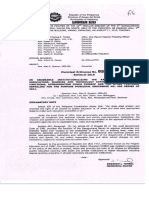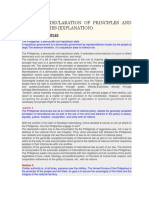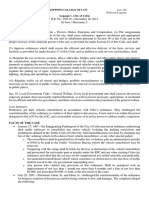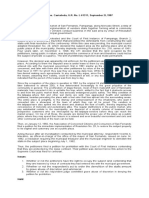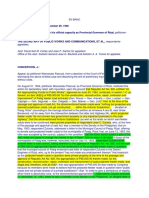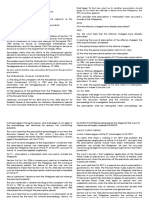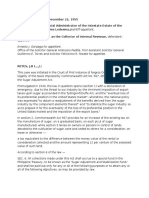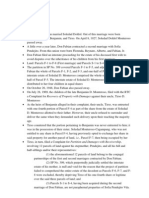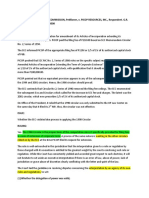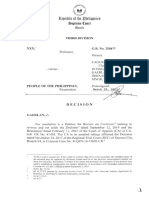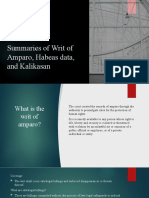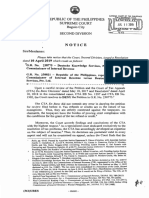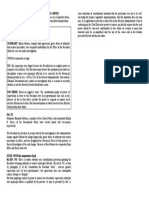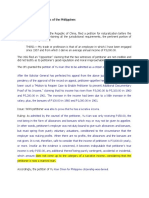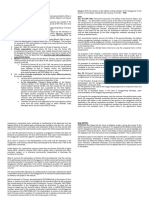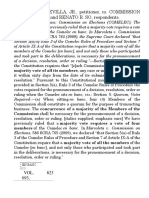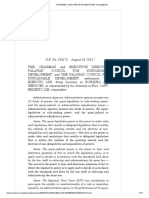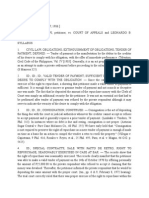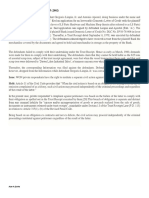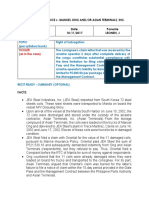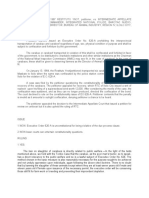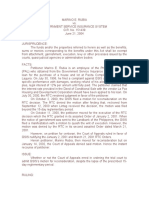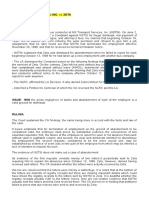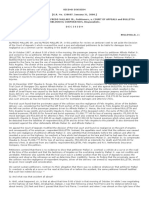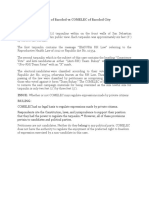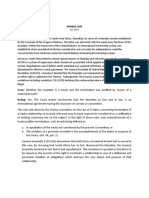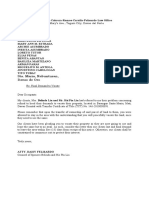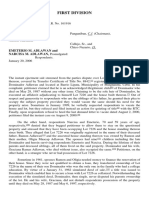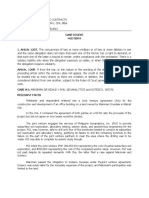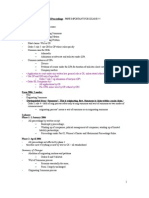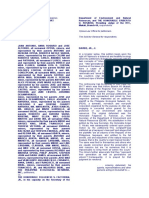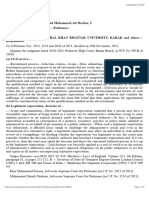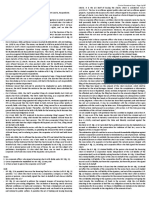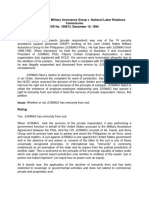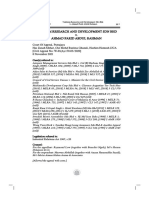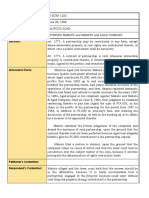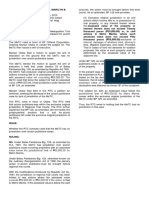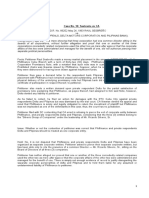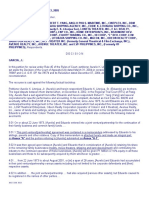Socrates Vs Sandiganbayan Digest Rule 110
Socrates Vs Sandiganbayan Digest Rule 110
Uploaded by
May AnascoCopyright:
Available Formats
Socrates Vs Sandiganbayan Digest Rule 110
Socrates Vs Sandiganbayan Digest Rule 110
Uploaded by
May AnascoOriginal Title
Copyright
Available Formats
Share this document
Did you find this document useful?
Is this content inappropriate?
Copyright:
Available Formats
Socrates Vs Sandiganbayan Digest Rule 110
Socrates Vs Sandiganbayan Digest Rule 110
Uploaded by
May AnascoCopyright:
Available Formats
Socrates v SB, Feb 20, 1996
1.Facts: Petitioner alleged that there was violation of his right to a speedy trial by reason of the unreasonable delay
of six (6) years between the conduct of the preliminary investigation and the filing of the information, invoking
doctrine laid down in the leading case of Tatad vs. Sandiganbayan where the Court held that an inordinate delay of
three (3) years in the conduct and termination of the preliminary investigation is violative of the constitutional rights
of the accused to due process and speedy disposition of his case.
Issue: Whether there is a fixed period of delay in the resolution of Preliminary Investigation to violate the right of the
accused to speedy disposition?
Ruling: No. In the application of the constitutional guaranty of the right to speedy disposition of cases, particular
regard must also be taken of the facts and circumstances peculiar to each case.
It is palpably clear that the application of the Tatad doctrine should not be made to rely solely on the length of time
that has passed but equal concern should likewise be accorded to the factual ambiance and considerations. In the
cases at bar, while there may have been some delay, it was petitioner himself who brought about the situation of
which he now complains.
A speedy trial is one conducted according to the law of criminal procedure and the rules and regulations, free from
vexatious, capricious and oppressive delays. The primordial purpose of this constitutional right is to prevent the
oppression of an accused by delaying criminal prosecution for an indefinite period of time. In the cases at bar,
12
while there may have been some delay, it was petitioner himself who brought about the situation of which he now
complains.
2. Facts: petitioner avers that the informations filed against him on which the order of suspension was based, are
null and void in view of the non-inclusion of his co-principals which thus constitutes a violation of petitioner's right to
due process and equal protection of the law and, therefore, ousted respondent court of its jurisdiction over the case.
Petitioner alleges that in Criminal Case No. 18027, the board of directors of ERA Technology Corporation should
have been included as principals by indispensable cooperation because without them he could not possibly have
committed the offense.
Also, he claims that in Criminal Case No. 18028, the members of the Sangguniang Panlalawigan who issued the
resolutions authorizing the purchase and repair of the motor launch should likewise have been included as
principals by inducement or indispensable cooperation, considering that petitioner was allegedly merely
implementing their resolutions. Hence, according to him, since the informations are null and void, the suspension
order which is based thereon should necessarily also be declared null and void. We find no merit in petitioner's
arguments.
Ruling: First, the rule under Section 1, Rule 110 of the Rules of Court, as reformulated in Section 2, Rule 110 of the
1985 Rules on Criminal Procedure, is that all criminal actions must be commenced either by complaint or
information in the name of the People of the Philippines "against all persons who appear to be responsible for the
offense involved." The law makes it a legal duty for prosecuting officers to file the charges against whomsoever the
evidence may show to be responsible for an offense. This does not mean, however, that they shall have no
discretion at all; their discretion lies in determining whether the evidence submitted justify a reasonable belief that a
person has committed an offense. What the rule demands is that all persons who appear responsible shall be
charged in the information, which conversely implies that those against whom no sufficient evidence of guilt exists
are not required to be included. 32
This notwithstanding, it has equally been ruled that the failure of the fiscal to include the other public officials who
appear to be responsible for the offense charged as co-accused in the information filed against the accused does
not in any way vitiate the validity of the information under the Rules.33
removal of public officers.
A look into the legislative intent,
along with the legislative scheme,
convinces
us the more that the power of
suspension should be lodged with
the court.
While the law may not be a model
of precise verbal structure, the
intent is
there. Section 13 requires as a pre-
condition of the power to suspend
that
there be a valid information.
Validity of information, of course,
is determined
by the Court of First Instance
where the criminal case is
pending. That is
essentially a judicial function.
Suspension is a sequel to that
finding, an
incident to the criminal
proceedings before the court.
Indeed, who can
suspend except one who knows the
facts upon which suspension is
based?
We draw support from
Lacson vs. Roque, supra
, at page 469: "We are
certain that no authority or good
reason can be found in support
of a
proposition that the Chief
Executive can suspend an officer
facing criminal
charges for the sole purpose of
aiding the court in the
administration of
justice. Independent of the other
branches of the Government, the
courts
can well take care of their own
administration of the law."
The Anti-Graft and Corrupt
Practices Act, an important
legislation, should
not be artificially construed so as to
exclude the courts from the power
to
suspend — a prime tool designed
by Congress to prevent the power
which
an official wields from frustrating
the purity and certainty of the
administration of justice. Surely,
we should not be pedantically
exacting in
reading its provisions. We should
rather say that if the court's
power of
suspension incident to the court
proceedings is to be withheld or
narrowed
by construction, Congress should
have spelled it out in no uncertain
terms. .
..
The Court then hastened to
clarify that such a view may
not be taken as an
encroachment upon the power of
suspension given other officials,
reiterating in the
process that a line should be
drawn between administrative
proceedings and
criminal actions in court, that one
is apart from the other.
Elucidating further on the
possible danger which may
arise if the power of
suspension, in consequence of a
criminal action under Republic
Act No. 3019 is vested in any
authority other than
the court, it declared that:
There is reasonable ground to
believe that Congress did really
apprehend
danger should the power of
suspension in consequence of a
criminal case
under the Anti-Graft and Corrupt
Practices Act be lodged in any
authority
other than the court. Quite apart
from the fact that the court has a
better
grasp of the situation, there is one
other factor, and that is, the rights of
the
person accused. The court could
very well serve as a lever to balance
in one
equation the public interests
involved and the interests of the
defendant.
And then, there is the danger that
partisan politics may creep in. The
hand
of political oppression cannot just
be ignored especially if the
majority
members of the Provincial Board
and the defendant public local
elective
officer are on opposite sides of
the political fence. Power may
be abused.
Conversely, if both are of the
same political persuasion, the
suspending
authority will display reluctance in
exercising the power of suspension.
It is
thus that the statute should catch up
with the realities of political life.
There
is indeed the dispiriting lesson that
in a clash between political
considerations
and conscience it is the latter that
quite often gets dented . . .
xxx xxx xxx
Therefore, since suspension is
incident to removal and should
proceed from
one who should logically do so,
and considering that in the
operation of a
given statute fairness must have
been in the mind of the
legislators, we
brush aside needless refinements,
and rule that under Section 13
of the
Anti-Graft and Corrupt Practices
Act, once a valid information
upon the
provisions thereof is lodged with
the Court of First Instance, that
court has
the inescapable duty to suspend the
public official indicted thereunder.
These cases have long been on
the line, unduly stretched
beyond their logical
parameters and the permissible
time frame. Indeed, it is high
time, ironically in
fairness to petitioner himself, that
the same be now calcined in the
judicial crucible
into their ultimate configuration.
WHEREFORE, premises
considered, the petitions in
G.R. Nos. 116259-60 and
118896-97 are hereby
DISMISSED for lack of merit,
with costs against the
petitioner.
SO ORDERED.
Romero, Puno
and
Mendoza, JJ.,
concur
You might also like
- Torts - Cases and Materials Casebook 12th EditionDocument1,320 pagesTorts - Cases and Materials Casebook 12th EditionjmonroypalacioNo ratings yet
- Mo-957-S2015 KcastDocument32 pagesMo-957-S2015 KcastMay AnascoNo ratings yet
- Casuela Vs Office of The OmbudsmanDocument12 pagesCasuela Vs Office of The OmbudsmanAlvin HalconNo ratings yet
- Art 2 - Conti ExplanationDocument6 pagesArt 2 - Conti ExplanationJessa AdenigNo ratings yet
- Municipality of Hagonoy Vs DumdumDocument2 pagesMunicipality of Hagonoy Vs Dumdumtheo_borjaNo ratings yet
- Evidence 3dDocument52 pagesEvidence 3dEmilio PahinaNo ratings yet
- SALES Yapkimchuanv TiaoquiDocument2 pagesSALES Yapkimchuanv TiaoquiPrinsisaNo ratings yet
- 3.13 Soliven Vs MakasiarDocument4 pages3.13 Soliven Vs MakasiarJasenNo ratings yet
- Fort Bonifacio Development Corporation vs. Commissioner of Internal RevenueDocument28 pagesFort Bonifacio Development Corporation vs. Commissioner of Internal RevenueAriel AbisNo ratings yet
- Legaspi v. City of Cebu PDFDocument3 pagesLegaspi v. City of Cebu PDFGain DeeNo ratings yet
- Busilac Builders, Inc V Judge Charles AguilarDocument2 pagesBusilac Builders, Inc V Judge Charles AguilarMidzmar KulaniNo ratings yet
- Villasenor vs. OmbudsmanDocument2 pagesVillasenor vs. OmbudsmanAbdulateef SahibuddinNo ratings yet
- Villanueva vs. CastañedaDocument2 pagesVillanueva vs. CastañedaDane Pauline AdoraNo ratings yet
- Pascual vs. Secetary of Public Works 110 Phil 331 GR L - 10405Document6 pagesPascual vs. Secetary of Public Works 110 Phil 331 GR L - 10405norzeNo ratings yet
- Monge Vs PeopleDocument2 pagesMonge Vs PeoplejqdomingoNo ratings yet
- Case DigestsDocument4 pagesCase DigestsZolletta Dantes Rodriguez-GatchalianNo ratings yet
- National Liga NG Mga Barangay vs. Paredes Class NotesDocument6 pagesNational Liga NG Mga Barangay vs. Paredes Class NotesOnnie LeeNo ratings yet
- Romualdez V Marcelo DigestDocument2 pagesRomualdez V Marcelo DigestJia ChuaNo ratings yet
- Telecom V ComelecDocument1 pageTelecom V Comelecdwight yuNo ratings yet
- G.R. No. L-7859Document4 pagesG.R. No. L-7859Inter_vivosNo ratings yet
- CJS As Part of The Social Defense SystemDocument3 pagesCJS As Part of The Social Defense SystemRonalyn PaunalNo ratings yet
- RODRIGUEZ Vs TAN (92 PHIL 273)Document2 pagesRODRIGUEZ Vs TAN (92 PHIL 273)tops videosNo ratings yet
- Monteroso Vs CA - DigestDocument3 pagesMonteroso Vs CA - DigestVern Villarica Castillo0% (1)
- Securities and Exchange Commission vs. Picop Resources Inc.Document2 pagesSecurities and Exchange Commission vs. Picop Resources Inc.Arianne AstilleroNo ratings yet
- Heirs of Malabanan V de CastroDocument6 pagesHeirs of Malabanan V de CastroMicah Clark-MalinaoNo ratings yet
- Jure of The Guilt or Innocence of The Accused in The CriminalDocument3 pagesJure of The Guilt or Innocence of The Accused in The CriminalDondi AbacaNo ratings yet
- XXX Vs PeopleDocument13 pagesXXX Vs PeopleFritzie Lynne SumandoNo ratings yet
- Summaries of Writ of Amparo, Habeas Data, and KalikasanDocument15 pagesSummaries of Writ of Amparo, Habeas Data, and KalikasanPhillip Joshua GonzalesNo ratings yet
- Rolito Go V. Ca - Case Digest - Constitutional LAWDocument3 pagesRolito Go V. Ca - Case Digest - Constitutional LAWKatherine GutierrezNo ratings yet
- G.R. No. 210773 - GSIS Family Bank Employees Union v. VillanuevaDocument22 pagesG.R. No. 210773 - GSIS Family Bank Employees Union v. VillanuevaMayumi RellitaNo ratings yet
- Gamboa vs. Teves 2011Document4 pagesGamboa vs. Teves 2011Emmanuel C. DumayasNo ratings yet
- 13) DEUTCHE KNOWLEDGE Vs CIR - J Perlas - BernabeDocument3 pages13) DEUTCHE KNOWLEDGE Vs CIR - J Perlas - BernabejdonNo ratings yet
- Menzon V PetillaDocument4 pagesMenzon V PetillaJed MendozaNo ratings yet
- 445 ESQUIBIL Hebron v. ReyesDocument1 page445 ESQUIBIL Hebron v. ReyesCarissa CruzNo ratings yet
- Bpi Vs ManikanDocument2 pagesBpi Vs ManikanJoshuaLavegaAbrinaNo ratings yet
- 018 Lns International Manpower Services (But More of Evid Case)Document2 pages018 Lns International Manpower Services (But More of Evid Case)aaNo ratings yet
- Plunder NotesDocument5 pagesPlunder NotesMeg MagtibayNo ratings yet
- LEP Bar Ans Strikes and Lock Outs 2023Document11 pagesLEP Bar Ans Strikes and Lock Outs 2023Raymund RiveraNo ratings yet
- Ad Hos Nauclerus (An Integrative and Comprehensive Paper On Captain of The Ship Doctrine)Document31 pagesAd Hos Nauclerus (An Integrative and Comprehensive Paper On Captain of The Ship Doctrine)Alona Suzell RuyerasNo ratings yet
- Affidavit of Car Accident WitnessDocument2 pagesAffidavit of Car Accident WitnessMotlalepula BaloyiNo ratings yet
- 23 - PNR vs. Kanlaon ConstructionDocument2 pages23 - PNR vs. Kanlaon ConstructionAngelo Raphael B. DelmundoNo ratings yet
- Aboitiz Shipping v. General Accident Fire and Life Assurance CorporationDocument2 pagesAboitiz Shipping v. General Accident Fire and Life Assurance CorporationYieMaghirangNo ratings yet
- Yu Kian Chie Vs RoPDocument1 pageYu Kian Chie Vs RoPAnneNo ratings yet
- People v. NoradaDocument10 pagesPeople v. NoradaerforNo ratings yet
- 77) Navarro and Tamayo V CADocument2 pages77) Navarro and Tamayo V CAStephanie Griar100% (1)
- ERB vs. CADocument3 pagesERB vs. CAANTHONY SALVADICONo ratings yet
- Mamerto Sevilla Vs ComElecDocument15 pagesMamerto Sevilla Vs ComElecJohnday MartirezNo ratings yet
- Palawan Council V LimDocument15 pagesPalawan Council V Limanne6louise6panaga0% (1)
- Legaspi V CADocument7 pagesLegaspi V CAElizabeth LotillaNo ratings yet
- Province of Zamboanga Vs City ZamboangaDocument12 pagesProvince of Zamboanga Vs City ZamboangaLau NunezNo ratings yet
- 193 Sarmiento Vs CA, 394 SCRA 315 (2002)Document1 page193 Sarmiento Vs CA, 394 SCRA 315 (2002)Alan GultiaNo ratings yet
- Oriental Insurance vs. Manuel OngDocument3 pagesOriental Insurance vs. Manuel OngLeizandra PugongNo ratings yet
- REQUEST LETTER - Lydia ObiasDocument2 pagesREQUEST LETTER - Lydia ObiasMed Cabojoc Jr.No ratings yet
- YNOT V IACDocument2 pagesYNOT V IACViene Canlas0% (3)
- MGC Vs Collector SitusDocument5 pagesMGC Vs Collector SitusAira Mae P. LayloNo ratings yet
- US v. Baggay (01september1911)Document5 pagesUS v. Baggay (01september1911)k1685No ratings yet
- Civil Aeronautics Administration Vs Court of Appeals GR No L-51806Document9 pagesCivil Aeronautics Administration Vs Court of Appeals GR No L-51806Lourd CellNo ratings yet
- 16 Menchavez vs. Teves5.25Document1 page16 Menchavez vs. Teves5.25cassandra leeNo ratings yet
- Rubia Vs GSIS DigestDocument2 pagesRubia Vs GSIS DigestChristopher AdvinculaNo ratings yet
- 44 NS Transport Services Vs ZETA Case DigestDocument2 pages44 NS Transport Services Vs ZETA Case Digestjovani emaNo ratings yet
- Persons First 5 CasesffDocument21 pagesPersons First 5 CasesffCel DelabahanNo ratings yet
- SPL EXAM AnswerDocument6 pagesSPL EXAM AnswerRain Guiling MacodNo ratings yet
- Eastern Shipping vs. Iac FactsDocument6 pagesEastern Shipping vs. Iac FactsMay AnascoNo ratings yet
- Miles Med. Co. v. John D. Park & Sons Co. - 220 U.S. 373, 31 S. Ct. 376 (1911)Document2 pagesMiles Med. Co. v. John D. Park & Sons Co. - 220 U.S. 373, 31 S. Ct. 376 (1911)May AnascoNo ratings yet
- Mallari Vs CADocument3 pagesMallari Vs CAMay AnascoNo ratings yet
- United States v. Trenton Potteries Co - 273 U.S. 392, 47 S. Ct. 377 (1927)Document2 pagesUnited States v. Trenton Potteries Co - 273 U.S. 392, 47 S. Ct. 377 (1927)May AnascoNo ratings yet
- Diocese of Bacolod vs. COMELEC DigestDocument5 pagesDiocese of Bacolod vs. COMELEC DigestMay AnascoNo ratings yet
- Chicago Board of Trade Vs USDocument1 pageChicago Board of Trade Vs USMay AnascoNo ratings yet
- Republic of The Philippines Municipal Trial Court of Mati 11 Judicial Region Mati City, Davao OrientalDocument8 pagesRepublic of The Philippines Municipal Trial Court of Mati 11 Judicial Region Mati City, Davao OrientalMay Anasco100% (1)
- Demand Letter - LiuDocument1 pageDemand Letter - LiuMay AnascoNo ratings yet
- Monsanto Corp. vs. Spray-Rite Service CorpDocument1 pageMonsanto Corp. vs. Spray-Rite Service CorpMay AnascoNo ratings yet
- Republic of The Philippines Province of Davao Oriental Municipality of Mati Barangay Santa MariaDocument1 pageRepublic of The Philippines Province of Davao Oriental Municipality of Mati Barangay Santa MariaMay AnascoNo ratings yet
- Rodriguez vs. Judge DigestDocument2 pagesRodriguez vs. Judge DigestMay AnascoNo ratings yet
- Ganzales Vs IACDocument2 pagesGanzales Vs IACMay AnascoNo ratings yet
- Chapter 2, Page 50 ICJ 1971: Termination of Treaties Nimibia CaseDocument1 pageChapter 2, Page 50 ICJ 1971: Termination of Treaties Nimibia CaseMay AnascoNo ratings yet
- Rodriguez vs. Judge DigestDocument2 pagesRodriguez vs. Judge DigestMay AnascoNo ratings yet
- Pre Trial Brief ColladoDocument2 pagesPre Trial Brief ColladoMay AnascoNo ratings yet
- Sta. Maria, Nabunturan, Davao de Oro: February 12, 2013Document1 pageSta. Maria, Nabunturan, Davao de Oro: February 12, 2013May AnascoNo ratings yet
- WHO vs. Aquino DigestDocument1 pageWHO vs. Aquino DigestMay Anasco100% (1)
- PCL-World Trade Center FlyerDocument4 pagesPCL-World Trade Center FlyerMay AnascoNo ratings yet
- Usufruct CasesDocument24 pagesUsufruct CasesMay AnascoNo ratings yet
- First Division: ARNELITO ADLAWAN, G.R. No. 161916Document30 pagesFirst Division: ARNELITO ADLAWAN, G.R. No. 161916May AnascoNo ratings yet
- Cristobal vs. RonoDocument4 pagesCristobal vs. RonoMay AnascoNo ratings yet
- SUN MON TUE WED Thur FRI SATDocument3 pagesSUN MON TUE WED Thur FRI SATMay AnascoNo ratings yet
- Partnership List of CasesDocument46 pagesPartnership List of CasesMay AnascoNo ratings yet
- Digest Noceda vs. CADocument2 pagesDigest Noceda vs. CAMay AnascoNo ratings yet
- Lu - RR) Ar1: Il /iv".,brk Q-!T ! !L"Document12 pagesLu - RR) Ar1: Il /iv".,brk Q-!T ! !L"May AnascoNo ratings yet
- Cruz Vs Court of AppealsDocument2 pagesCruz Vs Court of AppealsMay AnascoNo ratings yet
- Credit Transaction Cases 2Document23 pagesCredit Transaction Cases 2May AnascoNo ratings yet
- Teague vs. FernandezDocument1 pageTeague vs. FernandezMay AnascoNo ratings yet
- People Vs AsuncionDocument1 pagePeople Vs AsuncionMay AnascoNo ratings yet
- 44 SPLP Boac Vs CadapanDocument3 pages44 SPLP Boac Vs CadapanJoesil Dianne SempronNo ratings yet
- THE COURT OF APPEAL OF ZAMBIA Edited 2023Document6 pagesTHE COURT OF APPEAL OF ZAMBIA Edited 2023Zamlink TransNo ratings yet
- English For LawDocument119 pagesEnglish For LawKomal AndhaleNo ratings yet
- Oblicon Case Digest 5Document15 pagesOblicon Case Digest 5LAWRENCE EDWARD SORIANONo ratings yet
- CASE-1 - G.R. No. 34840 - September 23, 1931Document2 pagesCASE-1 - G.R. No. 34840 - September 23, 1931Jordan AncayanNo ratings yet
- 4 Modes of Commencing Civil ProceedingsDocument13 pages4 Modes of Commencing Civil Proceedingsapi-3803117100% (1)
- Envi Cases - La VinaDocument100 pagesEnvi Cases - La VinaChristine Gel MadrilejoNo ratings yet
- Director of Land v. IAC, 146 SCRA 509 (1986)Document22 pagesDirector of Land v. IAC, 146 SCRA 509 (1986)bentley CobyNo ratings yet
- 01/06/2024, 6:19 PM 2022SCMR694Document6 pages01/06/2024, 6:19 PM 2022SCMR694hyydeerrNo ratings yet
- Jurisdiction of The Supreme Court in Civil Cases TableDocument4 pagesJurisdiction of The Supreme Court in Civil Cases TableNea Tan100% (1)
- Republic vs. SandiganbayanDocument57 pagesRepublic vs. SandiganbayanPatrick AlcanarNo ratings yet
- K H Construction CC V Jenkins N.O. and Another (CA326 of 2017) (2018) ZAECGHC 37 (22 May 2018)Document22 pagesK H Construction CC V Jenkins N.O. and Another (CA326 of 2017) (2018) ZAECGHC 37 (22 May 2018)wildgeeselodgeugandaNo ratings yet
- CrimPro CasesDocument67 pagesCrimPro CasesMaria Angelica DavidNo ratings yet
- Jusmag-V-NlrcDocument2 pagesJusmag-V-Nlrcjovani emaNo ratings yet
- Legal Forms - Capanas EH 401Document29 pagesLegal Forms - Capanas EH 401Jean AbellaNo ratings yet
- Telekom Research and Development SDN BHD v. Ahmad Farid Abdul RahmanDocument18 pagesTelekom Research and Development SDN BHD v. Ahmad Farid Abdul RahmanSarah AhmadNo ratings yet
- Case Citation: Date: Petitioners: Respondents: DoctrineDocument2 pagesCase Citation: Date: Petitioners: Respondents: Doctrinejvcruz2021No ratings yet
- BF Citiland Corp. Vs Marilyn B. OtakeDocument1 pageBF Citiland Corp. Vs Marilyn B. OtakeMiguel Alleandro AlagNo ratings yet
- Mcs Recent Case Laws NewDocument125 pagesMcs Recent Case Laws NewsandhyadbhaleraoNo ratings yet
- A. Kinds of Institution of Heirs 1. Simple or Pure, Art 777Document13 pagesA. Kinds of Institution of Heirs 1. Simple or Pure, Art 777111111No ratings yet
- Magistrates' Court Tariffs 11 September 2020Document23 pagesMagistrates' Court Tariffs 11 September 2020Michelle Taylor-CarstensNo ratings yet
- Filipinas Broadcasting Network Inc. v. Ago MedicalDocument2 pagesFilipinas Broadcasting Network Inc. v. Ago MedicalChristjohn VillaluzNo ratings yet
- CASE 6-11: Case No. 10: Sesbreño Vs CADocument1 pageCASE 6-11: Case No. 10: Sesbreño Vs CACJ MelNo ratings yet
- Municipality of Tupi Vs FaustinoDocument13 pagesMunicipality of Tupi Vs FaustinoDat Doria PalerNo ratings yet
- 2 Almario-Templonuevo v. Office of The OmbudsmanDocument4 pages2 Almario-Templonuevo v. Office of The Ombudsmanmei atienzaNo ratings yet
- Landela Safaris Adventure (Private) Limited V National Railways of Zimbabwe and 3 Others (160 of 2024) 2024 ZWHHC 160 (24 April 2024)Document21 pagesLandela Safaris Adventure (Private) Limited V National Railways of Zimbabwe and 3 Others (160 of 2024) 2024 ZWHHC 160 (24 April 2024)Panganayi JamesNo ratings yet
- CASE PRESENTATION K B PeethambaramDocument22 pagesCASE PRESENTATION K B PeethambarammohanNo ratings yet
- Devillier v. Texas, No. 22-913 (U.S. Apr. 16, 2023)Document9 pagesDevillier v. Texas, No. 22-913 (U.S. Apr. 16, 2023)RHTNo ratings yet
- 5 Litonjua vs. Litonjua, St. Al., G.R. No. 166299-300, December 13, 2005Document8 pages5 Litonjua vs. Litonjua, St. Al., G.R. No. 166299-300, December 13, 2005Francis Leo TianeroNo ratings yet

